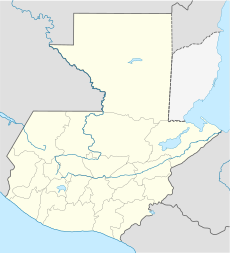Antigua Guatemala
|
La Antigua Guatemala Muy Noble y Muy Leal Ciudad de Santiago de los Caballeros de Guatemala |
||
|---|---|---|
| City | ||

Santa Catalina and Volcan de Agua in June 2005
|
||
|
||
| Nickname(s): La Antigua or Antigua | ||
| Location in Guatemala | ||
| Coordinates: 14°34′N 90°44′W / 14.567°N 90.733°W | ||
| Country |
|
|
| Department |
|
|
| Government | ||
| • Type | municipal | |
| Population (2013) | ||
| • Total | 45,669 | |
| Climate | Cwb | |
| Type | Cultural | |
| Criteria | ii, iii, iv | |
| Designated | 1979 (3rd session) | |
| Reference no. | 65 | |
| State Party |
|
|
| Region | Latin America and the Caribbean | |
Antigua Guatemala (Spanish pronunciation: [anˈtiɣwa ɣwateˈmala]) (commonly referred to as just Antigua or la Antigua) is a city in the central highlands of Guatemala famous for its well-preserved Spanish Baroque-influenced architecture as well as a number of ruins of colonial churches. It served as the capital of the Kingdom of Guatemala. It has been designated a UNESCO World Heritage Site.
Antigua Guatemala serves as the municipal seat for the surrounding municipality of the same name. It also serves as the departmental capital of Sacatepéquez Department.
The city had a peak population of some 60,000 in the 1770s; the bulk of the population moved away in the late 18th century. Despite significant population growth in the late 20th century, the city had only reached half that number by the 1990s. According to the 2007 census, the city has some 34,685 inhabitants.
Antigua Guatemala means "Ancient Guatemala" and was the third capital of Guatemala. The first capital of Guatemala was founded on the site of a Kakchikel-Maya city, now called Iximche, on Monday, July 25, 1524—the day of Saint James—and therefore named Ciudad de Santiago de los Caballeros de Goathemalan (City of Saint James of the Knights of Guatemala). Naturally, St. James became the patron saint of the city.
After several Kaqchikel uprisings, the capital was moved to a more suitable site in the Valley of Almolonga (place of water) on November 22, 1527, and kept its original name. This new city was located on the site of present-day San Miguel Escobar, which is a neighborhood in the municipality of Ciudad Vieja. This city was destroyed on September 11, 1541 by a devastating lahar from the Volcán de Agua. As a result, the colonial authorities decided to move the capital once more, this time five miles away to the Panchoy Valley. So, on March 10, 1543 the Spanish conquistadors founded present-day Antigua, and again, it was named Santiago de los Caballeros. For more than 200 years, it served as the seat of the military governor of the Spanish colony of Guatemala, a large region that included almost all of present-day Central America and the southernmost State of Mexico: Chiapas.
...
Wikipedia


